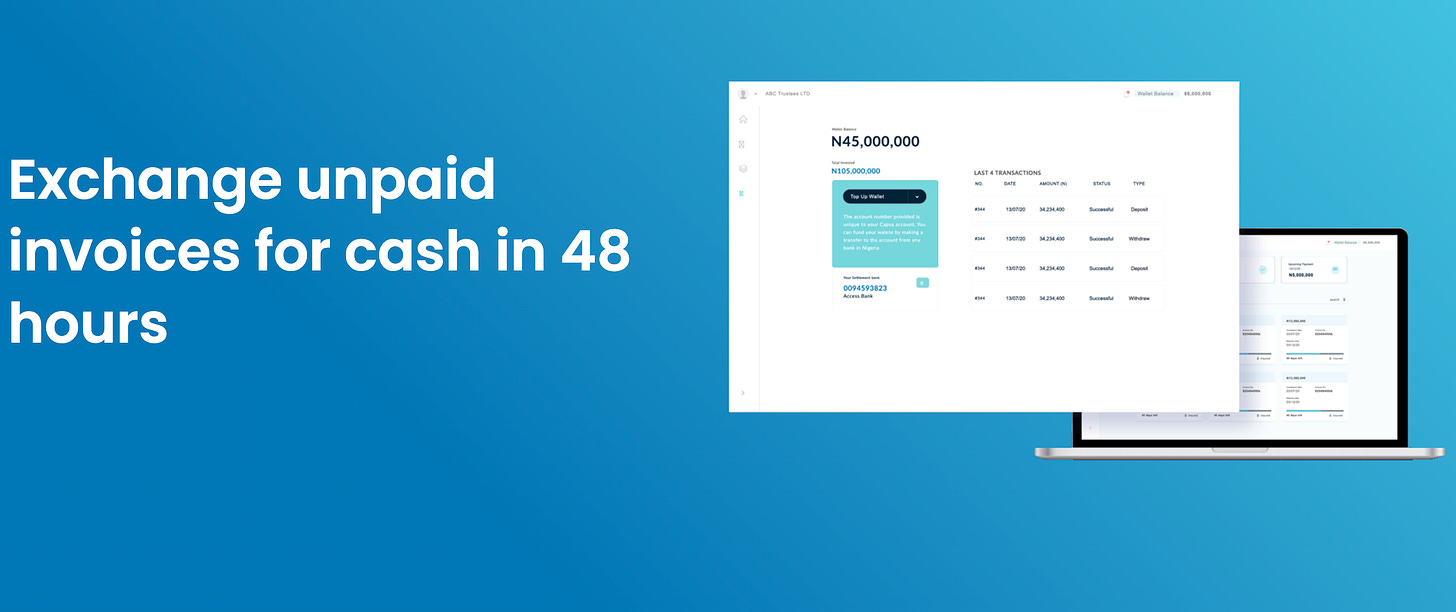GetCapsa wants to make invoice financing attractive again
Bringing life to a sector that has lost its sexiness
If you missed last week’s newsletters, catch up here and here. We’re interrupting regular publishing to bring you a special edition of the newsletter.
Today’s newsletter is brought to you by Fincra. Fincra provides reliable payments solutions for fintechs, online platforms and global businesses.
TOGETHER WITH FINCRA
NO ONE LIKES CHARGEBACKS
Hurdles like chargebacks often make the running of a global business difficult, because they cause frustrations for your customers. Fincra is here to help. With Fincra’s streamlined payment collection process you can provide a better payments experience for your customers while scaling your business to its fullest potential with a simple API integration. Learn more here.
GetCapsa wants to make invoice financing attractive again
An invoice financing startup, GetCapsa, is setting out to solve a problem that has plagued small businesses in Africa for decades; exchanging invoices for services that have already been rendered but not yet paid for. It’s a problem that’s peculiar to small and medium businesses that serve as vendors or contractors to blue-chip companies which often have stipulated timelines within which they can pay vendors.
These payment cycles are a real hassle for businesses. Most multinational companies have payment cycles that last anywhere from 30-60 days after local purchase orders are issued. It makes it difficult for businesses to stay in positive cash flow territory, and many B2B service providers are left really waiting around for months to get paid. This situation means B2B service providers often need cash while waiting for their receivables.
This is why invoice financing startups originally sprung up; to allow their clients to exchange unpaid invoices for cash. These startups provide small and medium businesses and vendors with cash flow financing, and this offering is important in Africa, where the credit sector is still in its infancy. In 2020 for instance, only 2% of Nigerians got loans from formal financial institutions. Credit facilities are even more difficult for small businesses, even when they have receivables as some sort of collateral.
This problem of needing cash when you have unpaid invoices is the problem that Capsa, founded by Mustapha Suberu, Chukwuka Nwagbara and Segun Dada, is set up to solve. GetCapsa’s proposition is interesting; instead of just handing out cash in exchange for those invoices, it has created a marketplace where small and medium B2B businesses can meet financiers. The businesses can put up the existing invoices they have and receive offers from multiple financiers before deciding on the one whose terms are the most favorable.
A breath of fresh air in a staid sector?
Invoice financing had its time in the sun sometime in the last decade, with startups like InvoizPaid and Nvoicia being some of the more recognisable names on the continent. But in the recent past, invoice financing seems to have become unsexy, and the sector has been subsumed by companies that describe themselves as providing financing for SMEs. It’ll take a bold approach to make the sector attractive again.
This is probably why GetCapsa’s approach with a marketplace is interesting, and the company says it has seen interest from financiers and small businesses who traded invoices worth over $8m since July 2021. For the financiers who offer to buy the invoices on offer, Capsa offers a new type of asset class that is relatively risk-free, yet with decent returns. “When we started our pilot test, the average invoice size was around $3000, but today we’re seeing invoices of up to $100,000,” Mustapha Suberu told me. It’s definitely an asset class that will have fund managers paying attention, in a climate where good returns are proving more difficult to find.
Yet, invoice financing is not without its perils, and it’s easy to see that Capsa has taken the marketplace route to avoid the big risks of putting its own money up. Two of the biggest issues with invoices are verification and discount rates from financiers that reflect the risk. Capsa says that the sheer competition of a marketplace means that rates are not fixed and that SMBs don’t have to accept terms that are not favourable. Verification is another monster entirely.
Everything rises and falls on verification
Without properly verifying that a B2B service provider is really a vendor to a blue-chip company, an invoice financing startup can run into trouble. Verification also involves knowing that the invoices the businesses have are real and that the payment cycles actually line up. These details are important because invoice financing is basically a transfer of obligation from the supplier or SMB to the blue-chip companies. Verification and the transfer of obligation are what gives financiers comfort.
Perhaps, what’s comforting is that the verification process is automated, with Capsa integrating the blue-chip companies it works with and allowing them to confirm the details of a vendor or an invoice in a few clicks. All aspects of the verification process will need to hold up if Capsa is going to be a long-term hit with financiers.
Yet that’s looking into the future. For now, Capsa’s immediate goal is to scale the solution it has now successfully deployed over the past eight months with what it says is an impressive uptake. Will a marketplace model prove to be the secret sauce that makes invoice financing sexy again? GetCapsa is taking a shot at finding out.




